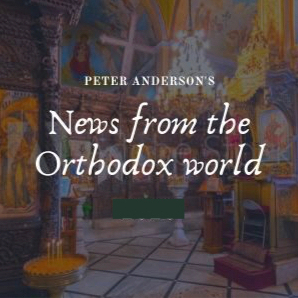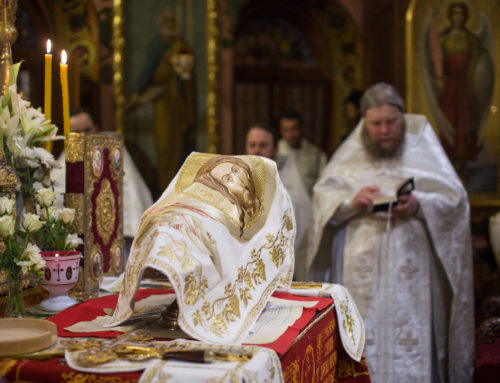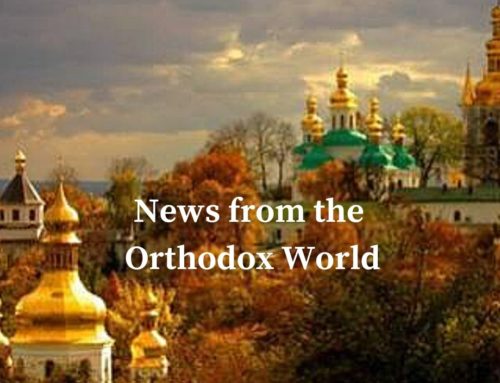Peter Anderson reports from the Orthodox world.
Longstanding reporter of the news from the Eastern Church, Peter Anderson shares our dream of a unified Christianity. His love for Orthodoxy has driven him to this personal mission to share the news of East with the world through his email list. The Urbi et Orbi Foundation is proud to share his efforts and his insights with you.

Last evening (January 6), now retired Archbishop Kondrusiewicz of Minsk-Mogilev, celebrated Mass for the feast of the Epiphany at the Cathedral of St. Francis Xavier in his hometown area of Grodno. It was a very emotional time for the Grodno Catholics and for the Archbishop himself. https://catholic.by/3/news/belarus/12700-grodna-imsha Two short videos, each of which shows different parts of the evening, can be watched at https://www.youtube.com/watch?v=eMP_P7MGoXk (4+ minutes with many emotional comments by viewers) and https://www.youtube.com/watch?v=M1vkKAzhjuk (2+ minutes). An excellent article about the evening was written by a journalist from Tut.by, one of the most popular websites in Belarus. https://news.tut.by/society/714025.html (the article also contains many excellent photos) I have pasted below a Google translation of the article, parts of which were written in Russian and parts in Belarusian. It believe that the article captures the spirit of the evening very well and is very much of a tribute to the Archbishop.
I would also like to add my own personal tribute to him. In 1988 a group of us in Seattle decided to form an ecumenical “sister churches” program between the Christian churches of Seattle and the Christian churches of Leningrad. It was during those exciting times when the churches of the Soviet Union were first regaining their freedom after over 70 years of persecution. The future patriarch Metropolitan Alexy of Leningrad was an enthusiastic supporter of the program and was in Seattle as the guest of the program for eight days in September 1989. Archbishop Kondrusiewicz, then Apostolic Administrator of European Russia, was in Seattle at the invitation of the program for three days in June 1993. During that time, he stayed at our home. When I picked him up at the airport, I was surprised that his total luggage was one very small handbag. He was a wonderful guest with no pretensions. He was quite athletic, and each day would put on some short athletic pants and jog through our neighborhood. Both my wife and I were very impressed by him both as a bishop and a person. At the end of his visit, my wife told him that he must return and spend a short vacation with us.
The next year Archbishop Kondrusiewicz was in Los Angeles and gave us a telephone call. He accepted Ann’s invitation and spent April 10-18 with us. He wanted to improve his English, so we arranged a week-long intensive English-language instruction for him at Seattle University (the local Catholic university run by the Jesuits). However, we also took him on the weekend for a real vacation in the beautiful San Juan Islands. He was a very easy guest to have. He said daily Mass for us at our home, and it was a very special time for us. He became very close to our hearts.
On February 11, 2002, the Vatican announced that the four Catholic apostolic administrations in the Russian Federation had become dioceses. The Vatican also made Archbishop Kondrusiewicz a metropolitan archbishop responsible for an “ecclesiastical province” consisting of the four Russian dioceses. This administrative move caused an uproar in the Russian media and harsh criticism by the Moscow Patriarchate. It was claimed that it was an effort to make Russia a province of the Vatican! Of course, a “province” is simply a Catholic term used for the area of a metropolitan archbishop. In fact the United States has 35 Catholic “provinces”! Being in Moscow, Archbishop Kondrusiewicz was in the center of the storm. Furthermore, there continued to be accusations against the Catholic Church will respect to alleged proselytism. Archbishop Kondrusiewicz spoke out against the criticism of the Catholic Church, and this in turn caused irritation on the part of the critics. In subsequent years, efforts were made by the Vatican to improve its relationships with the Moscow Patriarchate. In my opinion, one of the elements of the attempt to improve relations was to transfer Archbishop Kondrusiewicz to Minsk in 2007.
I talked to Archbishop Kondrusiewicz by telephone shortly after his transfer. He referred to himself as a soldier of the Church. He accepts orders without complaining. He also said that in term of relations with the Orthodox, the difference between Moscow and Minsk was the difference between “night and day.” In Moscow, he had headed the Catholic Church in Russia during the time when relations were at their lowest, due in part to the strong desire of Pope John Paul II to visit Russia. In Minsk, the Orthodox Church was headed by Metropolitan Filaret who was very open to good relations with Catholics.
In my personal opinion, Archbishop Kondrusiewicz deserves very high marks for what he did both in Moscow and Minsk. As in Moscow, he spoke out against what he considered wrong in the current crisis in Belarus. Now, as a good soldier, he accepts without grumbling the decision of Pope Francis with respect to his retirement. To Archbishop Kondrusiewicz, I sing “Many Years.”
Peter Anderson, Seattle USA
“WE ARE STRONG WHEN WE ARE TOGETHER.” HOW TADEUSZ KONDRUSIEWICZ WAS MET IN GRODNO FARNY CHURCH
By Olga Komyagina / Tut.by
A festive and very touching service was held in Grodno at the Farny [this word means “parish” – not a church of a religious order] Church, in which Metropolitan Tadeusz Kondrusiewicz took part. It contained both traditional prayers and sermons, and the Metropolitan’s memories of his childhood in Grodno, and conversations about faith and unity. And also loud and long applause, real emotions, jokes and even tears (there were a lot of them).
On January 6, Catholics celebrate the feast of the Three Kings or Epiphany. By tradition, believers come to churches on this day for a solemn Mass, and priests also consecrate chalk, incense, and gold. But now almost no one brings jewelry to the church, and Kondrusevich jokes that if someone has golden teeth, you can smile, but he talks more about pieces of chalk that parishioners brought to the service, and then they will write on the doors of their houses and apartments of the letters K, M and B, symbolizing the names of the wise men who came to worship Jesus.
At the evening celebratory Mass in the Farny Church, it was more crowded than ever. Some parishioners even stood in the street. Someone says that he came to the festive mass, but did not know that Metropolitan Tadeusz Kondrusiewicz would attend it, and someone, on the contrary, decided to visit the temple precisely because of the arrival of the Archbishop. By the way, Orthodox Christians also came to the church.
Kondrusiewicz says that these days he not only arrived in Grodno, but also visited his small hometown – in Adelsk, where he also held a service. And even mentioning faith, he suddenly remembers how, as a schoolboy, he was going along Kirov Street, saw the already blown up Vytautas Church [the largest church in Grodno, constructed in the 1300s by Grand Duke Vytautus and blown up by the communist authorities in 1961] and then remembered the words of the people: “That’s it, the church is gone.” But at the same time, he says, he also remembers how the townspeople defended the Farny Church, where this festive service is taking place right now. Kondrusiewicz recalls that people literally laid down on the floor of the church in order not to allow the shrine to be closed, and the church “survived”.
In general, the service in the Farny Church was very touching. Kondrusewiez’s voice kept breaking and trembling, and it seemed that he did not want to hide his emotions and tears. The parishioners, listening to the Metropolitan, at first secretly wiped away their tears, and then they did not hesitate to cry.
The Metropolitan conducted the service in Polish, switching from time to time to Belarusian and Russian. He said that Belarusians now have many tests – both the coronavirus epidemic and the crisis that the country is currently experiencing. “And everyone must give himself an answer, who I am before God, before Jesus Christ, and what kind of future I wish to build for myself, my family, city, my country, and land where I live,” the Metropolitan said. “Today our society is divided […], but someday it will all end and the wounds of hatred will heal. These wounds require an elixir of love and forgiveness. Everything depends on us, and our destinies also depend on us.
After the service, people reached out to the Metropolitan – to say something, to congratulate him on the anniversary and to wish him good health. We talked a lot, emotionally. About love, pride and faith.
— And you taught us to love the Belarusian language, because you speak it, you taught us to pray. We are proud of you and all these four months we have been praying for you and at a distance with you. And God heard our joint prayer — says one of the women.
Young parishioners told the Metropolitan that all the time that he was abroad, they came to the Farny Church every day and at a certain time began a joint prayer for his return.
“You — the archbishop of our hearts,” said one of the girls. Tadeusz Kondruisiewicz was moved, of course, by the words of the Grodno residents.
— “Thank you to everyone who prayed these four months, it was very important for me, and I felt this prayer, because I know about it, being in contact with priests in Belarus. I am often asked what was the worst. I had a place to live, I had something to eat, I had a place to celebrate Mass, but I waited. Every day started with looking at the email. Or maybe there is some news that I can come back? It wasn’t long, but it came. God works miracles, but with the help of people. Sincere thanks to those who (here the metropolitan switches to Russian. – Comment TUT.BY) supported me, it was important. Prayer pierces the heavens, and it was another sign of solidarity. We are strong when we are together.”


